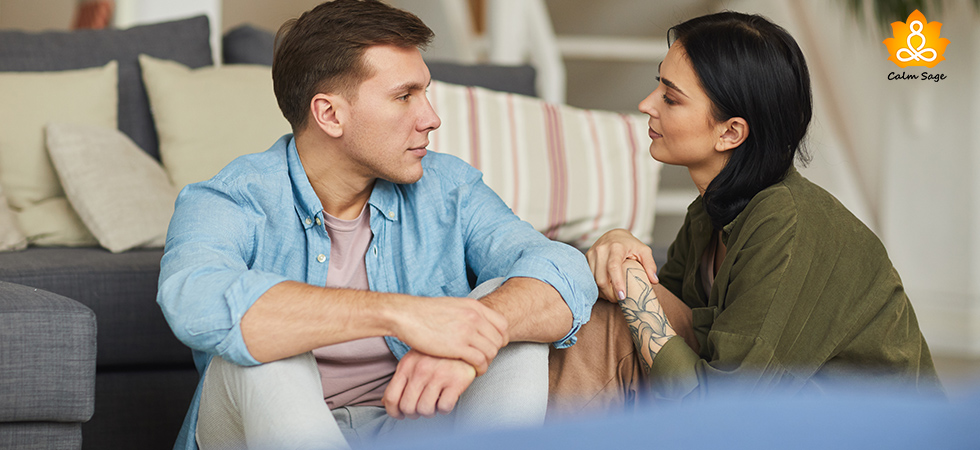When & How To Talk To Your Partner About Your Depression | Tips To Keep In Mind

Living with depression can be challenging, not only when it comes to your professional or social life but romantic relationships as well. If you’ve experienced depression or if you’re experiencing depression for the first time, the hallmark symptoms can make it difficult for you to enjoy a fun, open, and happy relationship with your partner.
But did you know that being able to share your challenges of mental struggles with your partner and having their support can be healthy for you and your relationship?
Yes! Talking about depression with your partner means being true to yourself and your mental health struggles. Especially with something that has the potential to affect both your lives.
Talking to your partner or spouse about your depression can help them understand how they can support you. One of the symptoms (and also a result) of depression is isolation or loneliness. Having a loving partner’s support can help you see a situation from a different perspective and also let you see the hope for a better future.
First, Let’s Take A Look At What Depression Might Look Like For You

Depression is one of the most affected mental illnesses around the world according to the National Institute of Mental Health (NIMH). For people experiencing a depression relapse or first-time depression, symptoms can vary from mild to severe.
As difficult as it can be, talking about your depression and its symptoms can make it easier for your partner to support you. Your partner is your advocate, your cheerleader, so telling them about your symptoms can be awkward and difficult but important.
Now, if you don’t know what you need, how will you convey your needs to your partner?
The first step is to understand your symptoms and how those are affecting your overall wellness. Everyone’s symptoms of depression can vary. Check-in with yourself to understand how depression looks like for you.
Some common symptoms of depression can be:
- Feelings of hopelessness
- Loss of interest in activities
- Experiencing fatigue
- Irritability
- Changes in appetite
- Changes in sleep patterns
- Negative thoughts
When Is The Right Time To Tell Your Partner About Your Depression?

It’s not about a particular time or a day that you should keep in mind about when to tell your partner about your depression. What matters here is to do whatever makes you feel most comfortable.
It’s okay if you want to talk over breakfast or during a casual conversation if it makes you feel more at ease. The point is to not feel embarrassed or guilty when it comes to sharing your struggles with your partner. Remember, depression is not something you should feel ashamed of.
If you don’t know how to tell your partner, you can also consider using pop culture references such as suggesting watching a movie and spend the time after discussing the struggles in the movie. Comparing and contrasting your experiences with those of a movie character can help.
Pick an activity that makes you feel comfortable about sharing your struggles and experiences with your partner. The overall point here is to let your partner express their opinion on your mental health struggles and let them decide how they want to move forward in the relationship.
How To Start The Conversation?

Now that you’ve decided to talk to your partner about depression, here are some conversation starters you can use to outline your discussion:
1. Know Your Intentions
What are you looking for? Is it emotional support? Or is it more than just an understanding? These questions are important before you begin the conversation. Once you know why and what you need from your partner, you can think about the hows of starting the conversation.
Some questions to help you get started can be:
- How much are you willing to tell your partner about your depression?
- What is the reaction you’re hoping for?
- What kind of support are you looking for?
- Do you want your partner involved in your treatment plan?
Once you know your intentions, you can begin preparing a plan on how to begin your conversation. Let your partner know your intentions too. Telling them what you need from them at this point can help.
2. Use Statistics & Resources
One of the important things to do is to educate yourself about depression and how it affects someone’s life. Sharing information and resources with your partner would be effective if you know about it from a clinical and educational perspective.
Experiences of depression are different for everyone and the most important thing to do is to understand the signs, types, causes, and treatments available for depression. It is also important to note that depression can coexist with other mental health disorders.
If you’re worried about your partner’s response, then it is suggested you bring official statistics and resources to the table. How you start the conversation depends on your relationship but sharing resources can help your partner better understand your struggles.
3. Share Your Treatment Plan
Regardless of whether you’re experiencing a depression relapse or first-time depression, make sure your partner is involved in your treatment plan and is aware of your feelings. You might think you can handle your depression alone (and while you can), you shouldn’t. Emotional support from a loved one can help in your recovery.
If you’re seeing a therapist or a counselor, ask them to see in what ways you can add your partner into your therapy plan. Having your partner share your treatment plan can help them understand how to adjust to your daily life and see how they can contribute to your recovery.
You can also ask your partner to accompany you to your sessions. This will allow your partner to get a deeper insight into your struggles and experiences.
4. Keep Communication Open & Honest
If your partner fails to offer you support, it’s not your fault. They might not understand your depression or how to help you. Talking to your partner about your depression is not only about strengthening your bond but also about improving the communication between you two.
Opening up about your depression with your partner should not change the dynamics of your relationship. If your partner is unsure how to support you, you can let them know what you need from them. Keep the communication line open at all times.
Any kind of negative reaction may cause trouble in your relationship but it will not be because of your depression. It could be a sign that your relationship is not as strong as you had hoped. Whether you’re in a relationship or not, your mental peace and health should be your priority.
If your partner’s response is troubling you, you can always seek couples therapy or individual therapy to understand how to move forward.
Writer’s Thoughts
Talking about your depression with your partner can be challenging but it can help you gain more support and help. Depression is a part of you but it does not define who you are as an individual. It isn’t something you should be ashamed of either. Try to be open and honest about your experiences with your partner.
Not talking about something as important as depression can affect your relationship and cause your partner to distance themselves from you if you’re not open about what’s bothering you. While having a mental illness is not your fault, it takes a lot of courage and bravery to open up about it.
Deciding to share your struggles is a huge step forward and a very important step for your recovery process. Remember, you are not alone in your struggles. Talking to your partner about depression cannot be easy but with the above-mentioned steps, it can be possible.
I hope the above steps will help you. If you’d like to connect with a professional counselor, you can always write to us at info@calmsage.com or DM us on social media. You can also click here to connect with licensed and trained professionals of your choice.
Did you find this article helpful? Let me know in the comments below! We’re always here for you!
Take Care!




















